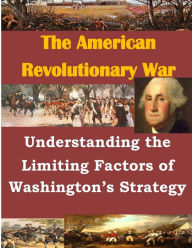Understanding the Limiting Factors of Washington's Strategy U.S. Army Command and General
by Staff Coll
2020-04-21 16:22:26
Understanding the Limiting Factors of Washington's Strategy U.S. Army Command and General
by Staff Coll
2020-04-21 16:22:26
During the American Revolution, as the Commander in Chief of the Continental Army, George Washington was responsible for determining the military strategy of the rebellious colonies. Throughout the war, diplomatic, social, and economic factors preven...
Read more
During the American Revolution, as the Commander in Chief of the Continental Army, George Washington was responsible for determining the military strategy of the rebellious colonies. Throughout the war, diplomatic, social, and economic factors prevented Washington and his subordinate commanders from developing a strategy that allowed militia soldiers to fight in the same formations as soldiers of the Continental Army. During the conflict, the Continental Congress took measures to maintain control of the Continental Army, which hampered Washington's ability to plan and execute military strategy. Although recruiting problems, training challenges, and complications with the command structure limited Washington's ability to form strategy and employ the Continental Army, by 1778, Washington and his subordinate commanders successfully developed a professional force that was capable of fighting against the British Army. Despite the militia's lack of discipline, inconsistent regulations and limited training, over time, Washington cleverly used the militia in specific roles to enhance his strategy. Once Washington understood how diplomatic, social, and economic factors restricted his strategy, he combined the military capabilities of the Continental Army in a complimentary manner with the strengths of the militia which enabled the rebellious Americans, with the support of European allies, to defeat the British.
Less









.jpg)
















.jpg)



